Nikhil Pinnaparaju
Results of the NeurIPS 2023 Neural MMO Competition on Multi-task Reinforcement Learning
Aug 17, 2025Abstract:We present the results of the NeurIPS 2023 Neural MMO Competition, which attracted over 200 participants and submissions. Participants trained goal-conditional policies that generalize to tasks, maps, and opponents never seen during training. The top solution achieved a score 4x higher than our baseline within 8 hours of training on a single 4090 GPU. We open-source everything relating to Neural MMO and the competition under the MIT license, including the policy weights and training code for our baseline and for the top submissions.
Arabic Stable LM: Adapting Stable LM 2 1.6B to Arabic
Dec 05, 2024Abstract:Large Language Models (LLMs) have shown impressive results in multiple domains of natural language processing (NLP) but are mainly focused on the English language. Recently, more LLMs have incorporated a larger proportion of multilingual text to represent low-resource languages. In Arabic NLP, several Arabic-centric LLMs have shown remarkable results on multiple benchmarks in the past two years. However, most Arabic LLMs have more than 7 billion parameters, which increases their hardware requirements and inference latency, when compared to smaller LLMs. This paper introduces Arabic Stable LM 1.6B in a base and chat version as a small but powerful Arabic-centric LLM. Our Arabic Stable LM 1.6B chat model achieves impressive results on several benchmarks beating multiple models with up to 8x the parameters. In addition, we show the benefit of mixing in synthetic instruction tuning data by augmenting our fine-tuning data with a large synthetic dialogue dataset.
Rephrasing natural text data with different languages and quality levels for Large Language Model pre-training
Oct 28, 2024



Abstract:Recently published work on rephrasing natural text data for pre-training LLMs has shown promising results when combining the original dataset with the synthetically rephrased data. We build upon previous work by replicating existing results on C4 and extending them with our optimized rephrasing pipeline to the English, German, Italian, and Spanish Oscar subsets of CulturaX. Our pipeline leads to increased performance on standard evaluation benchmarks in both the mono- and multilingual setup. In addition, we provide a detailed study of our pipeline, investigating the choice of the base dataset and LLM for the rephrasing, as well as the relationship between the model size and the performance after pre-training. By exploring data with different perceived quality levels, we show that gains decrease with higher quality. Furthermore, we find the difference in performance between model families to be bigger than between different model sizes. This highlights the necessity for detailed tests before choosing an LLM to rephrase large amounts of data. Moreover, we investigate the effect of pre-training with synthetic data on supervised fine-tuning. Here, we find increasing but inconclusive results that highly depend on the used benchmark. These results (again) highlight the need for better benchmarking setups. In summary, we show that rephrasing multilingual and low-quality data is a very promising direction to extend LLM pre-training data.
Stable Code Technical Report
Apr 01, 2024



Abstract:We introduce Stable Code, the first in our new-generation of code language models series, which serves as a general-purpose base code language model targeting code completion, reasoning, math, and other software engineering-based tasks. Additionally, we introduce an instruction variant named Stable Code Instruct that allows conversing with the model in a natural chat interface for performing question-answering and instruction-based tasks. In this technical report, we detail the data and training procedure leading to both models. Their weights are available via Hugging Face for anyone to download and use at https://huggingface.co/stabilityai/stable-code-3b and https://huggingface.co/stabilityai/stable-code-instruct-3b. This report contains thorough evaluations of the models, including multilingual programming benchmarks, and the MT benchmark focusing on multi-turn dialogues. At the time of its release, Stable Code is the state-of-the-art open model under 3B parameters and even performs comparably to larger models of sizes 7 billion and 15 billion parameters on the popular Multi-PL benchmark. Stable Code Instruct also exhibits state-of-the-art performance on the MT-Bench coding tasks and on Multi-PL completion compared to other instruction tuned models. Given its appealing small size, we also provide throughput measurements on a number of edge devices. In addition, we open source several quantized checkpoints and provide their performance metrics compared to the original model.
Neural MMO 2.0: A Massively Multi-task Addition to Massively Multi-agent Learning
Nov 07, 2023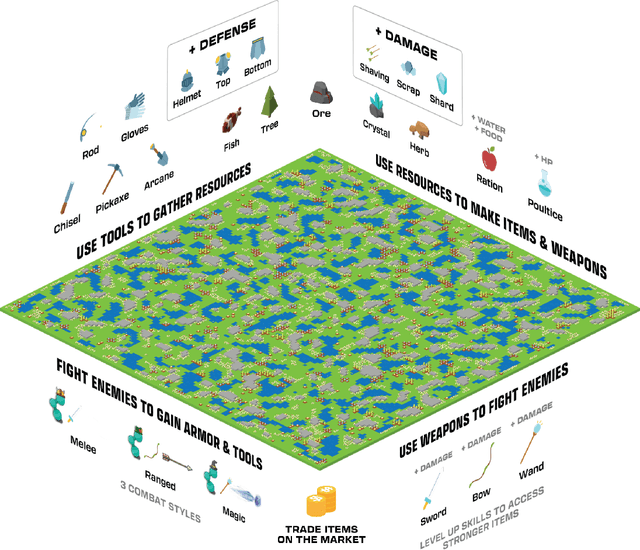
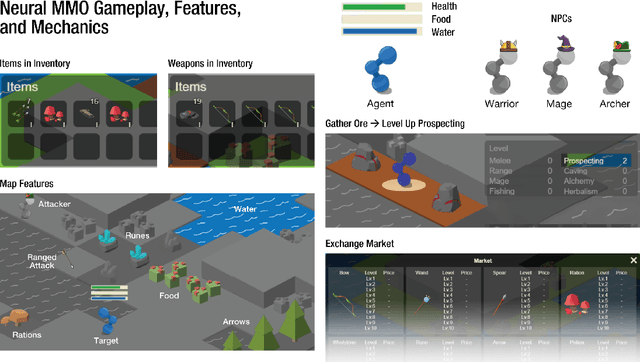
Abstract:Neural MMO 2.0 is a massively multi-agent environment for reinforcement learning research. The key feature of this new version is a flexible task system that allows users to define a broad range of objectives and reward signals. We challenge researchers to train agents capable of generalizing to tasks, maps, and opponents never seen during training. Neural MMO features procedurally generated maps with 128 agents in the standard setting and support for up to. Version 2.0 is a complete rewrite of its predecessor with three-fold improved performance and compatibility with CleanRL. We release the platform as free and open-source software with comprehensive documentation available at neuralmmo.github.io and an active community Discord. To spark initial research on this new platform, we are concurrently running a competition at NeurIPS 2023.
Summaformers @ LaySumm 20, LongSumm 20
Jan 10, 2021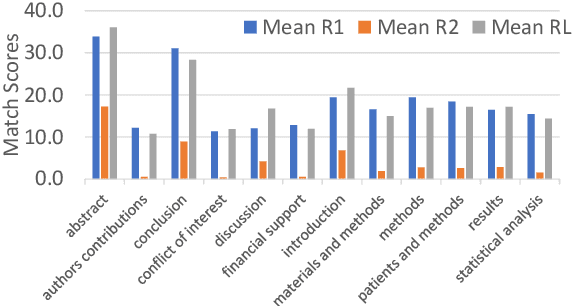
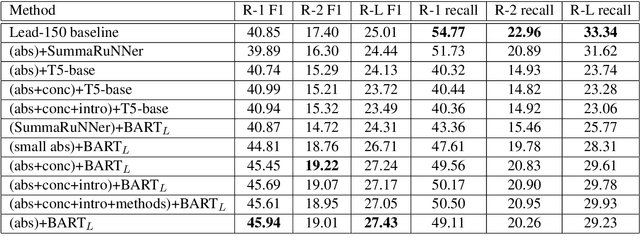
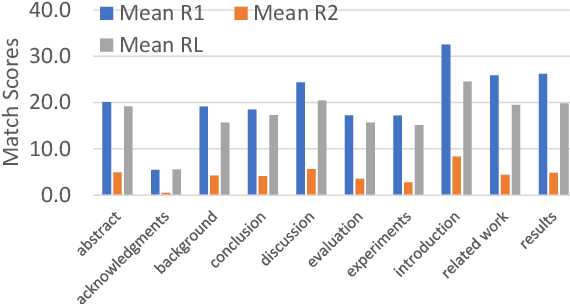

Abstract:Automatic text summarization has been widely studied as an important task in natural language processing. Traditionally, various feature engineering and machine learning based systems have been proposed for extractive as well as abstractive text summarization. Recently, deep learning based, specifically Transformer-based systems have been immensely popular. Summarization is a cognitively challenging task - extracting summary worthy sentences is laborious, and expressing semantics in brief when doing abstractive summarization is complicated. In this paper, we specifically look at the problem of summarizing scientific research papers from multiple domains. We differentiate between two types of summaries, namely, (a) LaySumm: A very short summary that captures the essence of the research paper in layman terms restricting overtly specific technical jargon and (b) LongSumm: A much longer detailed summary aimed at providing specific insights into various ideas touched upon in the paper. While leveraging latest Transformer-based models, our systems are simple, intuitive and based on how specific paper sections contribute to human summaries of the two types described above. Evaluations against gold standard summaries using ROUGE metrics prove the effectiveness of our approach. On blind test corpora, our system ranks first and third for the LongSumm and LaySumm tasks respectively.
* Proceedings of the First Workshop on Scholarly Document Processing (SDP) at EMNLP 2020
 Add to Chrome
Add to Chrome Add to Firefox
Add to Firefox Add to Edge
Add to Edge